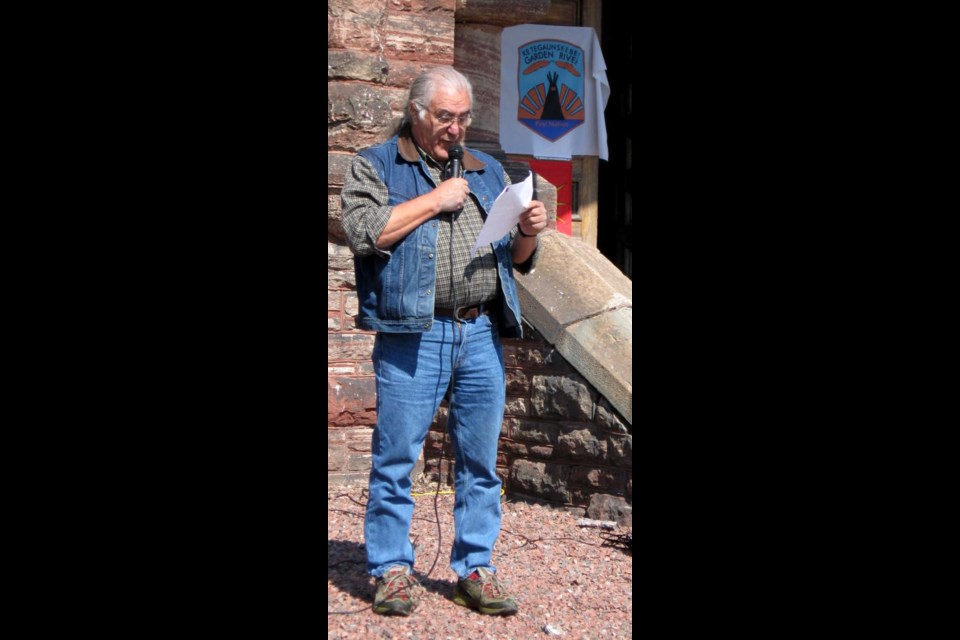There are a lot of positive things happening in Garden River First Nation, says band chief Lyle Sayers.
And it's not government that's doing it. "It's our own people that are doing it," Sayers said during a National Day of Action demonstration yesterday near St. Marys Paper.
"We're creating employment and we're creating businesses in our community," Chief Sayers (shown) said. "It helps people get off that welfare system and live good lives."
But this economic growth is not free and it isn't easy either, Sayers (shown) said.
The engine that will fuel more economic growth and continued social healing should be running on money generated from resources found on treaty lands.
But that's not happening.
"They were our resources and we should be able to take a piece of that pie to help our communities get stronger and better," Sayers said.
And if there's not more sharing of resources as promised in treaties that were written to last as long as the grass grows and the rivers flow, then sooner rather than later the warriors will emerge, he said.
"In our area we have a number of companies that have their lines coming through our community. There's railways, there's highways, Internet connections, gas lines," Sayers said. "Those are resources that are going through our community and we're not getting paid enough to allow that to happen. We need these companies to come back and negotiate with us to ensure that the monies that are coming are going to assist us."
Sayers said that many among his people are tired of talk and want to see action.
They are ready to tear out the lines, block the highways and dig up the rails if they have to.
But he and other community leaders are trying to hold them back.
"We are a peaceful people and we're trying to work with governments to ensure that some of the things we talked about this morning will be looked at," said Sayers.
A number of speakers at yesterday's demonstration addressed the crowd of about 75 people who came out to listen and feast in solidarity.
Garden River First Nation Band Councillor Blaine Belleau talked about the citizenship cards that band members use as identification to cross the border into the United States.
He said Anishinabe are guaranteed free passage across that line by treaties.
Cree, Ojibway and the other Anishinabe nations are sovereign and do not need a passport to enter their own traditional lands on either side of the St. Marys River.
Garden River members are using a prototype of the citizenship card and Belleau hopes it will be rolled out for other Anishnabe people to use in the next six to eight months.
Association of Iroquois and Allied Indian Deputy Grand Chief Chris McCormick talked about the need to continue to promote a rights-based agenda from the position of nationhood.
He said the people must protect their treaty rights and not subscribe to the misconception that treaty rights are for Anishnabe.
"The land and the resources are ours," he said. "The treaties give the visitors rights to our land. If it's not retained within a treaty then it doesn't apply to us."
McCormick told the story of a friend asking him why his people don't just leave the reserves and go move to where the jobs, clean water and good schools are.
Why not just spread out and become Canadian?
"I'm sure the Ojibway, Cree, Mowhawk, Iroquois and other Anishnabe nations would be as happy to do that as the French, English, Spanish, Germans and Finns would be to give up their nationhood to become European," said McCormick.
Meanwhile, people living in many Anishnabe communities live in conditions that few people in the world would accept, said Vern Cheechoo, Algoma University Shingwauk Anishinaabe Student Association president.
"Our people have been through a lot," he said. "The colonial government has tried to take our headdresses, our drums, our ceremonies - everything about who we are."
"We wouldn't be having this Day of Action if our people had been treated fairly in our lands," Cheechoo said.
The National Day of Action demonstration at St. Marys Paper was held at the location of the signing of several treaties.
It was held in conjunction with peaceful demonstrations on highways, near railways and at other locations across Canada.
